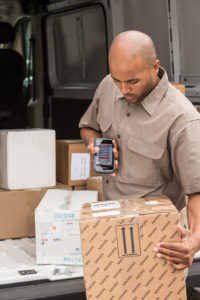Mobile-First Strategies to Create Smarter Supply Chains
By: Karen Bomber, Contributor

Mobile devices allow companies to focus on customer satisfaction and overall efficiency. Image courtesy of Honeywell Productivity Services and Solutions
Due to a dramatic increase in online orders, mobile workers in the supply chain industry are more important than ever while facing heightened pressure to speed up fulfillment. According to Digital Commerce 360, worldwide consumers spent $861 billion online shopping in 2020, a 44% increase from 2019. This sharp growth in ecommerce and the resulting consumer demand for delivery and curbside services put added stress on an already taxed supply chain, particularly the mobile workers handling goods along the journey.
To ensure these workers are equipped to meet the increased volume and accelerated delivery time consumers expect, software and hardware solutions need to advance at an equal pace. When software and hardware act in harmony, workers and the business have access to the data needed to make better business decisions.
A Mobile-First Strategy
An integral part of supply chain success is a mobile-first strategy that leverages devices and task-specific apps to allow companies to better meet the needs of both buyers and sellers. Mobile-first strategies are particularly important for the last mile as it can make or break a successful transaction.
In North America, 58% of companies that had a mobile-first, last-mile strategy said it effectively reduced their operational costs. Mobile devices help reduce costs, improve visibility and allow companies to focus on customer satisfaction and overall efficiency.
When last-mile strategies are flawed, supply chain management and the resulting customer experience are negatively impacted, as is the ability to create new revenue streams. Speed, accuracy and efficiency are key drivers to last-mile success. We know consumers have little patience for delays or receiving incorrect packages, and inefficiency in delivery services leads to increased retailer costs.
A successful last-mile strategy is fully connected and increasingly smart due to software and hardware innovations. It includes mobile software platforms, purpose-built devices, real-time visibility, driver orchestration, intelligent carrier selection, real-time customer scheduling and predictive management. These innovations also ensure productivity and safety for mobile workers, as well as providing them with data intelligence programs fit for supply chain visibility and improvement.
Software Innovation
The complex challenges of the supply chain and logistics industry cost enterprises trillions of dollars annually. The key to industry evolution is the forward movement of data intelligence at a faster pace. With more knowledge available, enterprises and workers are both quicker and more efficient.
Suites of enhanced supply chain software for mobile computers offer powerful solutions to increase efficiency and deliver better customer experiences. Low-code SaaS platforms like Honeywell’s FarEye include an open API architecture for software integration and allow mobile workers with devices to manage, visually track and monitor delivery logistics operations. Implementing SaaS-driven platforms enable real-time problem solving with end-to-end operational visibility to address challenges in the supply chain.
GPS driver tracking and delivery management software is another tool that assists mobile workers by communicating a product’s location. From vehicles to wristwatches, the importance of GPS tracking is highlighted throughout the final steps leading to a completed delivery. Various features, such as route optimization, offer drivers immediate insights regarding suggested priorities, traffic conditions and the average time to complete a delivery. Like GPS directions in a car, systems communicate a driver’s route in real time while considering external factors. These software advancements drive delivery improvements, which can lead to a superior customer experience.
Hardware Innovation

An integral part of supply chain success is leveraging devices and task-specific apps to meet the needs of both buyers and sellers. Image courtesy of Honeywell Productivity Services and Solutions
Software is essential to the technology evolution; however, it can’t exist without innovative hardware. While software provides data intelligence and autonomous capability for product enhancement, hardware advancements improve product functionality and safety.
An open API architecture approach provides consistency for enterprises to upgrade current hardware models, manage device refreshes and quickly deploy software applications. Software integration across different devices provides a unified platform for all hardware systems. An open API architecture also allows business to easily test and deploy critical software and hardware when adding new devices. Devices that support future versions of the operating system without making new hardware investments are critical to the technology evolution.
In addition, health and safety are top of mind for mobile workers post-COVID-19 and this has further accelerated the demand for robust hardware materials. Harsh cleaning solutions can degrade standard plastic housings, causing vital workplace assets to become discolored and parts to become brittle and break. This interrupts cleaning protocols that keep mobile workers safe. Disinfectant-ready housings allow devices to withstand more frequent cleanings. Devices go through multiple hands so frequent cleanings can help curb the spread of viruses, including COVID-19, for mobile workers.
In the supply chain industry, software and hardware must work together seamlessly to co-exist. Software brings computing intelligence and autonomous capability, allowing hardware to increase its effectiveness. The key to boosting mobile workers’ productivity and safety is utilizing software and hardware in harmony as this allows workers and the business to make smarter decisions. While the world adjusts to a new normal, the disruptive power of new software and hardware technologies is solving the complex challenges of the supply chain. The result – faster and more efficient mobile workers – unlocks the power of the successful supply chain. WMHS
Karen Bomber is the Director of Vertical Marketing, Honeywell Productivity Services and Solutions, which provides products, software and connected solutions that improve productivity, workplace safety and asset performance. The company achieves this through industry-leading mobile devices, software, cloud technology and automation solutions, the broadest range of personal protective equipment and gas detection technology, and custom-engineered sensors, switches and controls (https://sps.honeywell.com/us/en/).



